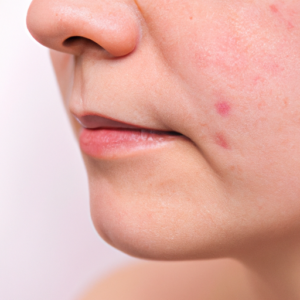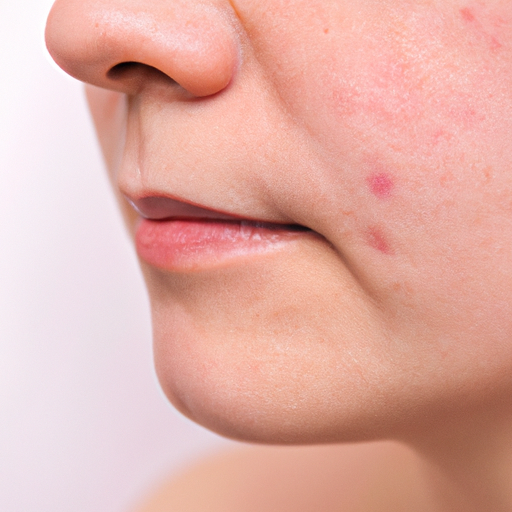Greetings! Let’s Talk About Acne Scarring, Shall We?
Hi there, fellow skincare enthusiasts! Today, I want to talk about a common skin concern that many of us struggle with: acne scarring. Acne scars are a type of hyperpigmentation that can be physically and emotionally challenging to deal with. From feeling self-conscious about our appearance to struggling with our self-esteem, acne scarring can really take a toll on our mental and emotional health. But how do we get acne scars in the first place? Let’s dive in!
“Causes of Acne Scarring: It’s Not Just a Surface Issue”
When it comes to acne scarring, we often think of it as just skin damage on the surface. However, the root causes go much deeper. As someone who has dealt with acne scarring myself, it’s important to understand the underlying factors that contribute to this condition.
Genetics
First and foremost, genetics play a role in how our skin reacts to acne. If your parents or siblings have dealt with severe acne and scarring, you may be more prone to it as well. While we can’t control our genetics, knowing this information can help us take preventative measures and seek professional treatments when necessary.
Hormones
Hormonal imbalances can also play a significant role in the development of acne and scarring. This is especially true for women who experience fluctuations in hormone levels during their menstrual cycles, pregnancy, or menopause. Treating hormonal acne may require a combination of lifestyle changes and medication.
Skin Trauma
Physical trauma to the skin, such as picking at pimples or using harsh exfoliants, can lead to further damage and scarring. It’s important to be gentle with the skin and avoid aggressive treatments that can potentially worsen the issue.

Overall, understanding the causes of acne scarring can help us take proactive steps towards prevention and treatment. While we may not be able to control all of these factors, being mindful of them can make a significant impact on the health and appearance of our skin.
“Scarred for Life: The Devastating Effects of Acne Scarring”
Alright, so I’m no stranger to the effects of acne scarring. As someone who has battled acne since puberty, I can attest to the physical and emotional impact that it can have on a person.
Firstly, let’s talk about the physically apparent scars left by acne. Whether they’re shallow or deep, these scars can be a real blow to one’s confidence level. They can feel like a constant reminder of the condition and the difficulty of trying to combat it. The scars can be temporary or permanent, and in some cases, can even worsen with age. Trust me, I’ve spent hours in front of mirrors with way too much concealer, trying to hide my scars.
But the emotional impact of acne scarring can be even more devastating. The shame, embarrassment and self-consciousness that people with acne scars may feel can lead to anxiety, depression, and even social isolation. It’s a constant struggle to feel confident and beautiful when it seems like the world sees you as “blemished” or “flawed”.
So, what can be done about it?
Prevention is key. This includes maintaining a balanced diet, regularly washing your face, and avoiding harsh skin products or picking at your acne. Topical treatments such as retinoids, alpha-hydroxy acids, and glycolic acid can also help reduce the risk of scarring.
If prevention fails, there are professional treatments like laser therapy, microneedling, and chemical peels that can be effective in reducing the appearance of scars. However, it’s important to consult with a dermatologist or skincare specialist before undergoing any of these treatments.
In conclusion, acne scarring can have a profound impact on a person’s physical and emotional well-being. While prevention is ideal, there are a variety of treatments available to help minimize the appearance of scars. Remember to always consult with a professional and be kind to yourself – scars or not, you are beautiful and deserving of love and respect.
Preventing and Treating Acne Scarring: My Top Tips
Dealing with acne is tough enough, but dealing with the aftermath of scarring can be even more challenging. Here are some tips for preventing and treating acne scars:
Watch Your Diet
Believe it or not, what you put into your body can affect your skin’s health. Eating a balanced diet filled with fruits, vegetables, and healthy fats can help decrease inflammation and promote healthy skin. On the other hand, consuming foods high in sugar and refined carbohydrates can lead to increased inflammation, which can worsen acne and scarring.
Try Topical Treatments
There are a variety of over-the-counter topical treatments available that can help fade acne scars. Look for products containing ingredients like vitamin C, retinoids, and niacinamide. It’s important to note that topical treatments may not work for more severe scarring, such as deep or pitted scars.
Visit a Professional
If you’re struggling with significant scarring, consider visiting a dermatologist to explore professional treatment options. Some treatments your dermatologist may recommend include chemical peels, microneedling, or laser resurfacing. These treatments can be expensive, but they are often effective at minimizing the appearance of scarring.
Remember, preventing and treating acne scars takes time and patience. But with the right approach, you can improve the appearance of your skin and feel more confident in your own skin.
Conclusion: Wrapping Up My Acne Scars Journey
Well, folks, that’s a wrap on my journey with acne scars. After much research, I’ve come to the conclusion that prevention is key when it comes to these pesky scars. Diet plays a significant role in skin health, so it’s essential to fuel our bodies with nutrient-dense foods. Topical treatments can also be helpful and are worth trying, but professional treatments such as chemical peels or laser therapy may ultimately be the most effective.It’s important to remember that dealing with acne scars is not only physical, but it also takes a toll on our mental and emotional well-being. It’s okay to seek support and talk to someone if you’re struggling with the emotional impact of scarring.I encourage anyone dealing with acne scars to take control of their skin health and explore different prevention and treatment options. Don’t be discouraged if it takes time to see results; it’s all about consistency and being patient with the process.Before I wrap up, I want to leave you with a helpful resource I stumbled upon during my research. Brightside Beauty has an informative article evaluating the effectiveness of chemical peels for acne scars. It’s worth checking out if you’re considering professional treatment.Thanks for joining me on this journey. Here’s to healthy, happy skin!
